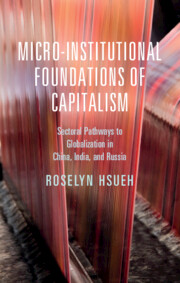Book contents
- Micro-institutional Foundations of Capitalism
- Micro-institutional Foundations of Capitalism
- Copyright page
- Dedication
- Contents
- Figures
- Tables
- Acknowledgments
- Part I Politics of Market Governance
- Part II Nations and Sectors: Patterns of Market Governance
- 3 China and Sectoral Variation
- 4 Security Imperatives, Infrastructural Development, and High-Tech Sectors
- 5 Political Stability, Local Goals, and Labor-Intensive Sectors
- 6 India and Sectoral Variation
- 7 Pro-Liberalization Transnational Business and High-Tech Services
- 8 Political Legitimacy, Economic Stability, and Labor-Intensive Small-Scale Sectors
- 9 Russia and Sectoral Variation
- 10 National Security and Infrastructure and Resource Sectors
- 11 Regional Development and Labor-Intensive Sectors
- Part III National Configurations of Sectoral Models
- Bibliography
- Index
11 - Regional Development and Labor-Intensive Sectors
Private Governance in Russian Textiles
from Part II - Nations and Sectors: Patterns of Market Governance
Published online by Cambridge University Press: 16 June 2022
- Micro-institutional Foundations of Capitalism
- Micro-institutional Foundations of Capitalism
- Copyright page
- Dedication
- Contents
- Figures
- Tables
- Acknowledgments
- Part I Politics of Market Governance
- Part II Nations and Sectors: Patterns of Market Governance
- 3 China and Sectoral Variation
- 4 Security Imperatives, Infrastructural Development, and High-Tech Sectors
- 5 Political Stability, Local Goals, and Labor-Intensive Sectors
- 6 India and Sectoral Variation
- 7 Pro-Liberalization Transnational Business and High-Tech Services
- 8 Political Legitimacy, Economic Stability, and Labor-Intensive Small-Scale Sectors
- 9 Russia and Sectoral Variation
- 10 National Security and Infrastructure and Resource Sectors
- 11 Regional Development and Labor-Intensive Sectors
- Part III National Configurations of Sectoral Models
- Bibliography
- Index
Summary
This chapter demonstrates that the lower degree of and narrower scope of the perceived strategic value of labor-intensive, non-value-added sectors, represented by textiles, for national security and resource management, has shaped their decentralization beginning under Gorbachev’s perestroika. Mass privatization after Soviet breakdown further reenforced the private governance pattern dominant in apparel and clothing. The cross-time sector and company case studies disclose the interacting strategic value and sectoral logics and show apparel and clothing factories have shut down or privatized to former managers only to languish with antiquated equipment. Today, Russian textile and garment manufacturers are outcompeted by illegal imports from China and the Commonwealth of Independent States. Industrial and technical textile sectors, which incorporate oil and petrochemicals and higher technological intensity, in contrast, experience the state intervention from central and regional governments of decentralized governance in response to political and economic pressures, such as oil boom and bust cycles and Western sanctions in post-Crimea annexation. The central government has designated petrochemicals a critical input for chemical fiber processing and provides fiscal incentives to develop technical textiles. Local governments have worked with local and national oligarchs to revive factories and production lines, and courted foreign direct investment.
Keywords
- Type
- Chapter
- Information
- Micro-institutional Foundations of Capitalism , pp. 305 - 328Publisher: Cambridge University PressPrint publication year: 2022



